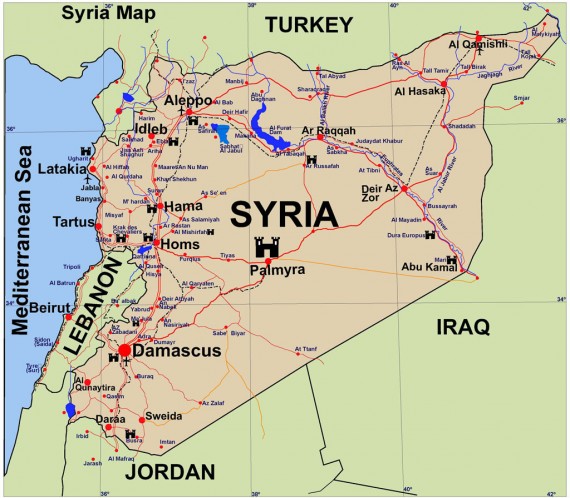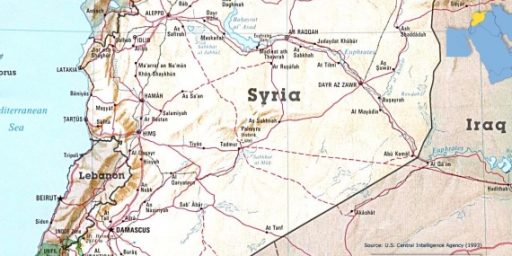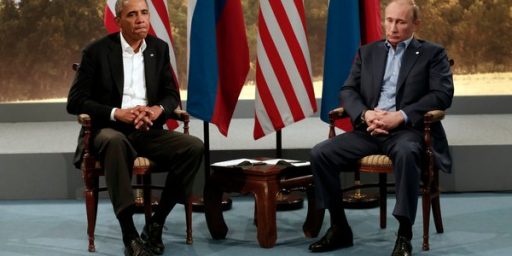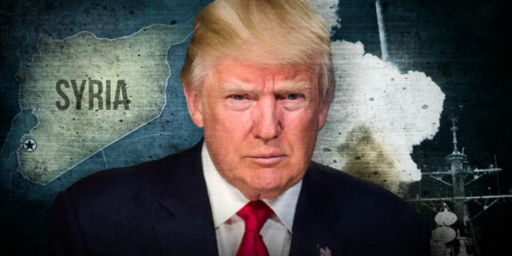Syrian Crackdown Continues, International Options Limited
International options with respect to Syria are limited and likely to have little impact on the governments treatment of civilians.
The Syrian government is continuing its brutal crackdown on civilians amid internati0nal condemnation, but there may not be much the world can do about it:
Ignoring mounting condemnations, the Syrian military deployed tanks, armored vehicles and snipers Wednesday into the symbolic center of Hama, a rebellious city that has emerged as a linchpin of the nearly five-month uprising, in what appeared a decisive step by President Bashar al-Assad to crush opposition to his rule.
The military’s assault on Assi Square, the scene of some of the biggest demonstrations against Mr. Assad’s leadership, marked a moment that many activists and residents had thought impossible: The government’s determination to retake by force a city that suffered one of the most brutal crackdowns in Syrian history in 1982.
But the government, whose calculations continue to mystify its own people and run the risk of invigorating the uprising, seemed to view the momentum of demonstrations there that numbered in the hundreds of thousands last month as a threat to its survival. The critical mass of the uprising there has spread to Deir al-Zour in restive eastern Syria, and together, the locales represent two of Syria’s five largest cities.
“The regime wants to finish with Hama as soon as possible,” said Hilal Khashan, a political science professor at the American University in Beirut.
Activists and residents in Hama said the city was under nearly continuous gunfire since the early hours of the day, with the tanks heading toward Assi Square before dawn. Amid scenes of confusion, they reported many casualties, adding to the toll since Sunday of more than 100 people, by activists’ count. They said some residents had tried to stop the advancing armored columns with barricades, many of them built of furniture, iron railing, rocks and cinderblocks, but stood little chance against the military’s might.
“The army is now stationed in Assi Square,” read a post on the Syrian Revolution Facebook page. “The heroic youths of Hama are confronting them.”
The government’s calculus — tentative efforts at reform made meaningless by a relentless escalation of violence – has plunged Syria into its deepest international isolation in decades. A crackdown that has killed more than 1,500 people, according to the United Nations, citing human rights groups, has given more resilience and fervor to an uprising that, for weeks, managed to turn out protests only in the thousands.
That the assault came during Ramadan, a holy, usually festive month on the Muslim calendar when the observant fast from dawn to dusk, made the violence even more egregious in the view of the Syria government’s critics. The government appeared to fear vows by the opposition to escalate the uprising, taking advantage of crowds that assembled in mosques for nightly prayers.
“Hama is under the fire for three days in this holy month of Ramadan,” said an opposition leader in Damascus, who asked not to be named. “Syrians are still in shock and they will wake up and protest against the Assad regime. No one can imagine that people there cannot find bread to eat, water to drink and electricity when it’s so hot.”
The latest international pressure on the Assad regime came today in the form of a United Nations Security Council condemnation of the regime’s actions. However, the condemnation contains no sanctions, calls for further action, or instructions to member nations to begin considering economic sanctions or changes in diplomatic action. No doubt, this is due in large part to the influence of Russia and China on the Council, neither of whom seem eager to back the kind of actions against Syria that they were willing to allow go forward against Libya. More importantly, though, it’s fairly clear that the options for the international community are far more limited this time around:
Syrians aren’t holding their collective breath. “We can’t really expect much from the international community,” says Jabri, and most Syrians are wary of external involvement in their struggle. The fractious opposition — which is only loosely connected to the street protesters, in many cases — is concentrating its efforts instead on building consensus and proving to Syrians that it is a viable alternative to Assad, a task made all the more difficult by the reality that until recently, as Jabri puts it, “no two Syrians could get together and talk about politics without ending up in jail.” New meetings are being planned both within Syria and abroad, possibly in Egypt and Saudi Arabia.
(….)
Few analysts think words will do much to damage the deeply entrenched Syrian regime, and some, like the Century Foundation’s Michael Hanna, worry that Assad could limp on far longer than anyone expects. Nor would multilateral sanctions, even if they do somehow pass the Security Council, have an immediate effect. “It’s unlikely that, short of massive defections within the security services at an elite level, outside pressure is going to change the calculus of the inner circle of the regime,” says Hanna. Instead of being toppled, he cautions, Assad could become another international pariah, like Saddam Hussein or the Burmese junta.
The Obama Administration has said more than once already that Assad is “on his way out” and that he’s lost legitimacy, but these words are fairly meaningless if events on the ground don’t precipitate a collapse of the Assad regime. Furthermore if there’s one thing that our misadventure in Libya has taught us, it is that predictions about when a dictator determined to fight to the last man will finally fall are easy to make, but unlikely to be accurate. According to most of the predictions that were made in March of this year, Qaddaffi should have been long gone by now. Instead, despite occasional signs of gains by the opposition and continued NATO bombardment, he clings stubbornly to power.
More broadly, though, I don’t think there’s much the West is going to be able to do in Syria because everybody knows that there’s a line that we’ll never be willing to cross:
Threats of military action against Syria aren’t going to have any credibility, because Assad and everyone else will understand them to be empty threats. France has ruled out military intervention in Syria, it is hard to imagine that Turkey will have any interest in hastening Syria’s collapse (which is what military action would accomplish), and there is no appetite in the U.S. for a fourth war in a predominantly Muslim country. Britain’s military is badly overstretched as it is, Libya has badly dented the government’s credibility at home, and there will be little enthusiasm for another campaign so soon. There will certainly be no appeal from the Arab League. Members of the Security Council may be willing to discuss Syria in the future, but authorizing military action will be out of the question for those members that see how the Libyan intervention has evolved in ways they don’t like. That will remain the case whether or not Gaddafi falls from power.
None of this is to say that I am advocating military intervention in Syria of any kind. For one thing, the Syrian opposition has said they don’t want it, and that’s fine with me. For another, the idea of international intervention in a nation so close to the powder keg of the Middle East is, quite simply, insane. I hate to say it, but it’s true, the people are Syria are, for the most part, on their own.







Just the other day the Russians announced that they would oppose imposing any sanctions on Syria which is hardly a surprise. Since Russia is a veto-wielding permanent member of the UN Security Council, that means no sanctions. The historical experience is that the Russians can be bought off this position but I’m not sure we’re in much of a position to horsetrade right now.
Who would be dumb enough to take on Syria when they have all of Saddam’s WMD?
@ponce:
There’s no evidence of that